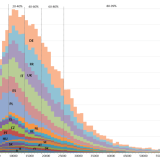
Hästi toimivad ja kaasavad tööturud
Hästi toimivad tööturud on finants- ja majanduskriisist toibuva majanduse töökohtade loomise potentsiaali täieliku ärakasutamise eeltingimus. Kriis avaldas ELi liikmesriikide tööturule väga erinevat mõju ning mõnda rühma, nagu noori ja madala haridustasemega inimesi tabas see eriti rängalt. Jätkuvad kiired struktuurimuutused tekitavad uusi probleeme ka seoses võimaliku tööjõunappuse ja oskuste sobimatusega eri sektorites ja piirkondades.
ELi peamine vahend tööhõive ja sotsiaalse kaasatuse edendamiseks on Euroopa Sotsiaalfond, mis aitab inimestel tööd saada, lõimib ebasoodsas olukorras olevaid inimesi ühiskonda ja tagab kõikidele elus õiglasemad võimalused. Kehtestatud on ka suur hulk Euroopa õigusakte, mis reguleerivad töötajate õigusi tööturul. Lisaks sellele esitas Euroopa Komisjon 2017. aasta aprillis Euroopa sotsiaalõiguste samba. Sammas tugineb ELi sotsiaal- ja tööhõivepoliitikale ning täiendab seda, et suunata mitme sellise valdkonna poliitikat, mis on hästitoimiva ja õiglase tööturu ja sotsiaalhoolekandesüsteemi sujuva toimimise jaoks olulised.
- Euroopa Komisjon: Euroopa Sotsiaalfond
- Euroopa Komisjon: Euroopa sotsiaalõiguste sammas




























